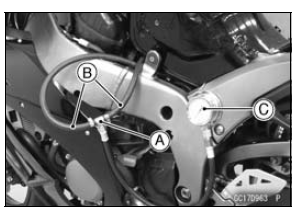

NOTE
Be sure the battery is fully charged.
Be sure to place a piece of cloth around the fuel outlet pipe of the fuel pump and the delivery pipe of the throttle body assy.
| WARNING Fuel is flammable and explosive under certain conditions and can cause severe burns. Be prepared for fuel spillage; any spilled fuel must be completely wiped up immediately. When the fuel hose is disconnected, fuel spills out from the hose and the pipe because of residual pressure. Cover the hose connection with a piece of clean cloth to prevent fuel spillage. |
Special Tools - Oil Pressure Gauge, 5 kgf/cm²: 57001-125
Fuel Pressure Gauge Adapter: 57001-1593
Fuel Hose: 57001-1607

| WARNING Fuel is extremely flammable and can be explosive under certain conditions resulting in serious injury or death. Do not try to start the engine with the fuel hoses disconnected. |
The fuel pump should operate for 3 seconds, and then should stop.
NOTE
After turning on the engine stop switch and ignition switch, inspect the fuel leakage from the connected portion of the special tools.
NOTICE
Do not drive the fuel pump 3 seconds or more without the fuel in the fuel tank. If the fuel pump is driven without the fuel, it may be damaged.
Fuel Pressure (with Engine Idling) Standard: 294 kPa (3.0 kgf/cm², 43 psi)
NOTE
The gauge needle will fluctuate. Read the pressure at the average of the maximum and minimum indications.
Turn the ignition switch to OFF.
Fuel Line Leakage (see Fuel Injector Fuel Line Inspection) Amount of Fuel Flow (see Fuel Flow Rate Inspection)
After above checks, measure the fuel pressure again.
Remove the fuel pressure gauge, hoses and adapter.
Install the removed parts (see appropriate chapters).
Start the engine and check for fuel leakage.
 Fuel Line
Fuel Line Fuel Flow Rate Inspection
Fuel Flow Rate InspectionESD Actuator Input Voltage Inspection
NOTE
Be sure the battery is fully charged.
Turn the ignition switch to OFF.
Disconnect the ESD actuator connector and connect a
suitable measuring leads [A] between these connectors
as shown.
Main Harness [B]
ESD Actuator [C]
Connect the peak voltage adapter [D] and a digital ...
Connecting Rod Bend Inspection
Remove the connecting rod big end bearing inserts, and
reinstall the connecting rod big end cap.
Select an arbor [A] of the same diameter as the connecting
rod big end, and insert the arbor through the connecting
rod big end.
Select an arbor of the same diameter as the piston pin
and ...
Rebound Damping Force Adjustment
To adjust the rebound damping force, turn the rebound
damping adjuster [A].
The standard adjuster setting is the 3 3/4 turns out from
the fully clockwise position.
WARNINGIf both adjusters are not adjusted
equally, handling
may be impaired and a hazardous condition may
res ...